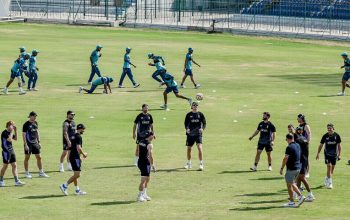The Supreme Court commenced the hearing on a set of petitions challenging the Supreme Court (Practice and Procedure) Act 2023 with newly sworn-in Chief Justice of Pakistan (CJP) Qazi Faez Isa convening a full court.
A full court comprises all 15 judges of the apex court. The hearing is being televised live on state television.
The full court comprises, Justice Sardar Tariq Masood, Justice Ijazul Ahsan, Justice Mansoor Ali Shah, Justice Muneeb Akhtar, Justice Yahya Afridi, Justice Aminuddin Khan, Justice Mazahar Ali Akbar Naqvi, Justice Jamal Khan Mandukhel, Justice Muhammad Ali Mazhar, Justice Ayesha Malik, Justice Athar Minallah, Justice Hasan Azhar Rizvi, Justice Shahid Waheed and Justice Musrat Hilali.
Before the hearing commenced today, the federal government urged the apex court to dismiss the pleas challenging the law, with Attorney General for Pakistan (AGP) Mansoor Usman Awan submitting a detailed reply for the same.
The government, in its reply, contended that the pleas were inadmissible.
At the outset of the hearing, CJP Isa said to the lawyers who had come to the rostrum that "appreciate that some of us have heard this matter before while some of us will hear it for the first time".
"A question was raised whether I should be part of the bench…and then a related question was asked that all those who will become the chief justice should become part of the bench…I think the best way to resolve that was to constitute a full court," said the CJP.
Arguments in the case started with Advocate Khawaja Tariq Rahim taking the rostrum. Soon after, Justice Ayesha asked the advocate what would happen to Section 5 in the event the law was upheld.
She said that there is a right of appeal that is provided under this law. "How do you visualise that right being exercised." The chief justice asked Rahim to read the law out aloud, however, the lawyer kept losing focus and the judges repeatedly told him to read the law.
Rahim started reading the law, however, he again stopped and said, “Framing of these rules, under Article 191, is the prerogative of the SC. When they framed the 1980 rules, the entire court sat together and together they framed the rules.”
He added that the "intrusion of the parliament" in to the affairs of the SC prompted him to file the petition as he felt "every institution must remain in its domain".
Justice Naqvi wondered if the advocate did not have any objection to unaccountable powers in one office.
Prompting Rahim to read out the Act again, Justice Isa asked whether the advocate was suggesting that the entire law was ultra vires the Constitution. The CJP added that response to every question is not needed immediately and advised the advocate to "absorb the questions and respond" when done with arguments.
During the reading of the law, Rahim contended that the Parliament should not have a say in the functions of the top court. Tomorrow Parlimament may order that a particular bench hears a particular case, he said.
At this the CJP directed the lawyer to restrict himself to the case at hand. "Let's not get into what they may or may not do…another petition can be filed over what Parliament decides to do in the future and we can look at it then," said CJP Isa.
As the hearing proceeded, Justice Akhtar wondered whether Parliament could clip judicial powers under Article 184(3) by requiring a committee to be formed of three senior judges to decide constitution of benches.
Article 184(3) of the Constitution pertains to the apex court's original jurisdiction and allows it to assume jurisdiction in matters concerning "public importance" with regards to enforcement of "fundamental rights" of citizens.
Justice Minallah pointed out that these powers earlier resided solely with the CJP and after the passage of this law an arugment was raised that the outcome of cases could be influenced by constituting benches, which erodes the independence of the judiciary.
The judge asked that if this argument is accepted then would the earlier traditional model be acceptable to Rahim.
"[traditional model] that one person could actually control the outcome of cases by the constitution of benches and this likely was the mischief that Parliament wanted to address,” he said.
Justice Ahsan interjected, referring to a previous SC judgment, wherein a verdict was given on the procedure to be followed by the chief justice to invoke SC's powers under Article 183.
Based on that judgment, a bench after reaching the conclusion that there is a matter of public importance may recommend to the CJP to constitute a bench and the top judge may then may or may not follow the suggestion after going over the bench's reasoning. "But at least he would record why he thinks he disagrees with the recommendations," said Justice Ahsan, adding that the power to constitute the bench is addressed in Section 2.
The judge observed that it appeared that Section 3 of the Act in question seemed to go beyond this. “It actually confers on the three-member committee, exercising administrative powers, to actually block the exercise of judicial powers," he remarked.
Justice Akhtar noted that the question here appeared to be whether the Parliament could block judicial power.
At one point Justice Hilali wondered whether the office of the CJP becomes "redundant" after the enactment of this Act while Justice Mandokhail asked whether it was the CJP's powers that had been curtailed or the apex court's.
Rahim argued that Sections 5, 6 and 7 were ultra vires to the Constitution.
Taking the rostrum next, advocate Imtiaz Rashid Siddiqui contended that the primary question was whether the Parliament had the power to promulgate this Act.
At one point during the hearing, CJP Isa reminded the counsels that the bench sought arguments on the invocation of Article 184(3), under which two essential points had to be established – that the case was a matter of public interest, and that it sought enforcement of fundamental rights.
Justice Isa observed that the high courts had been approached before the matter was brought to SC. The petitioners had opted to appeal to the court under Article 184 (3), which has a narrow scope, he noted.
When the lawyer continued to refer to previous judgments, the CJP reminded him to stick to the Constitution stressing that past judgments were secondary to the Constitution.
Asking the lawyer to read out Article 189, which stipulates “Any decision of the Supreme Court shall to the extent that it decides the question of law or is based upon or enunciates a principle law be binding upon all other courts in Pakistan,” the CJP emphasized on the phrase "all other courts".
Justice Minallah observed that the Parliament had diluted discretionary powers of the chief justice and picked three judges, not anyone from outside of the apex court. "It’s still the chief justice and the two senior most judges. No one’s fundamental rights are being affected, instead institutional independence is being strengthened,” he said.
The right of appeal is also being provided under the new law, remarked Justice Minallah, asking that which fundamental rights have been violated of the petitioner that Article 184(3) has been invoked.
Siddiqui maintained that the entire Act was ultra vires the Constitutiton. "This domain is not available to the Parliament," he argued.
While presenting arguments, Siddiqui said that he thought the idea behind the law was good but not the legislation itself.
This prompted Justice Minallah to ask whether the advocate believed the CJP should have ubriddled powers.
To this, Siddiqui replied that under the trichotomy of powers, the Parliament, the executive and the top court were to make their own rules, which stand on a "higher pedestal than ordinary law" and are based according to the Constitution.
On being asked which fundamental rights were being violated, Siddiqui said those gauranteed under Articles 9, 10 and 10-A.
Siddiqui contended that the legislature is bound by the Constitution, which requires that the legislature makes its own rules. "There are three organs of the state and they will function independent of one another,” he maintained.
The lawyer argued that it was his "fundamental right to ensure…that this constitutional encroachment is not made by Parliament". Referring to past judgments, he said that if a matter affects a large community of people then it is a question of public importance.
The CJP asserted again that the lawyer was stating articles of the Constitution instead of developing his arguments.
Case history
In April, an eight-member larger bench, headed by then chief justice Umar Ata Bandial had suspended the Practice and Procedure Act, even before its enactment. Since then, some apex court judges have been saying that the case should be decided at the earliest, because of wide-ranging impact.
The Supreme Court Practice and Procedure Act has several objectives, including granting the authority to take suo motu notices and form apex court benches to a three-member committee, consisting of senior judges, including the chief justice. Currently, it is the sole authority of the chief justice.
The bill was passed by the National Assembly on March 29 and by the Senate on March 30. After which it was sent to President Dr Arif Alvi for his assent. However, Alvi refused to approve the bill and on April 8, he sent it back to parliament for reconsideration.
A joint session of parliament approved the bill as it was on April 10 and sent it back to the president for his approval. As per the law, any bill sent to the president for a second time would be enacted after 10 days even if the president did not sign it into law.
However, on April 13 – a week before its automatic enactment on April 20 — the Supreme Court stayed the enactment of the law. In the meanwhile, the National Assembly issued the notification of the bill becoming the law in the Gazette of Pakistan.
During the hearing of a case recently, Justice Mansoor Ali Shah had stressed the need for a decision in the Practice and Procedure Act case at the earliest, saying that if the court declared the act valid, then all the judgments given under suo motu jurisdiction might lose their significance.
According to legal experts, the case, after taking rounds of parliament, the Presidency and the Courtroom No 1, has now been placed before the entire Supreme Court, adding that the judgment in the case could impact the accountability law amendment case, the Supreme Court Review of Judgment and Orders case.
This is for the first time in over eight years that a full court has been formed. Previously, the full court was formed in 2015 on the 21st Constitutional Amendment case, which was meant to establish military courts for speedy trial of terrorists.
However, during these years, demands were made many a time for forming of the full court to hear political cases and the cases against parliamentary legalisation. However, the requests were declined as the concept of like-minded benches prevailed.
The legal experts also suggest that Chief Justice Qazi Faiz Isa had showed his seriousness about unifying the judiciary by forming the full court, as soon as he took oath of office. They added that now, all the judges would determine the fate of this legislation.
Read the full story at the express tribune website.


